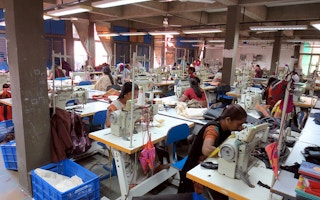She was 20 when the abuse started. Her supervisor at the garment factory where she worked would grope and pinch her, sometimes leaving bruises. Her complaints were ignored and her abuser went unpunished.
One in every seven women working in the garment industry in the southern Indian city of Bengaluru have been raped or forced into a sexual act at work, said a report released on Saturday.
Violence, intimidation, unwanted sexual attention, being forced to watch pornography, being punched, choked and burnt are part of the daily abuse faced by women employees in Bengaluru’s 1,200 garment factories which supply many global brands.
“
There is such a permissive environment of abuse in the factory, with the … supervisors often being the perpetrators. There is no fear of the existing laws.
Alison Gordon, executive director, Sisters for Change
The unnamed woman is among the 60 per cent of women garment workers who face intimidation and violence in “hostile” workplaces, according to a report released on Saturday by the women’s rights groups Sisters for Change and Bengaluru-based Munnade.
“We were shocked by the levels of sexual violence (we found) during our survey,” said Alison Gordon, executive director of the U.K.-based Sisters for Change.
“There is such a permissive environment of abuse in the factory, with the … supervisors often being the perpetrators. There is no fear of the existing laws.”
Much of India’s $40 billion garment and textile industry, which employs an estimated 45 million workers, operates in the informal sector and is poorly regulated.
Vulnerable workers, nearly three quarters of them women, have limited or no legal protection and few formal grievance mechanisms.
“What the report says is true not only in Bengaluru, but in factories and spinning mills across (India),” said Karrupu Samy, director of READ, a non-governmental group that works with garment workers in the Erode region of Tamil Nadu.
Crime and punishment
There are an estimated 500,000 workers working in and around Bengaluru, a major hub for the garment industry in south India.
The report, based on surveys of women workers, indicated that hardly any cases were reported to the authorities.
Eighty-two per cent of respondents said they did not report the crimes because they had no faith in the police or senior management to take action.
“The laws are in place but the awareness about them and the implementation is negligible,” Gordon told the Thomson Reuters Foundation.
The report urges the government to ensure compliance with the law and increase the frequency of factory inspections, with sexual harassment as a prime focus.
“The report provides solid evidence of the extent of abuse. Now there has to be a push for change,” Gordon said.
This story was published with permission from Thomson Reuters Foundation, the charitable arm of Thomson Reuters, that covers humanitarian news, women’s rights, trafficking and climate change. Visit www.trust.org










